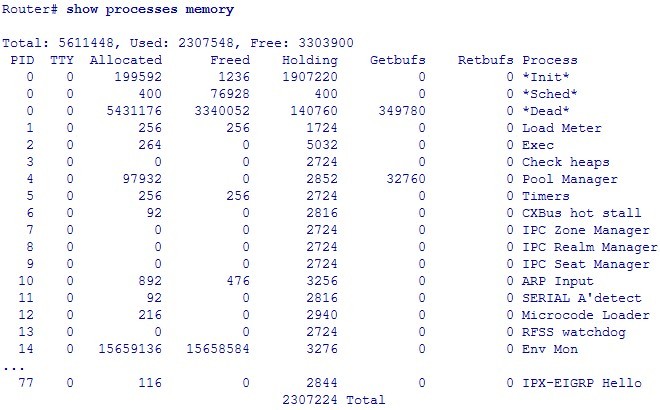
The show memory exec command is often used to check the amount of a router’s free memory. In troubleshooting cases where router performance is the focus, this is a major command used to see the statistics about the router’s memory.
To show memory used, use the show processes memory EXEC command.
Syntax Description: This command has no arguments or keywords.
Command Modes: EXEC
Command History
| Release | Modification |
| 10.0 | This command was introduced. |
Examples
The following is sample output from the show processes memory command:
Table: show processes memory Field Descriptions
| Field | Description |
| Total | Total amount of memory held. |
| Used | Total amount of used memory. |
| Free | Total amount of free memory. |
| PID | Process ID. |
| TTY | Terminal that controls the process. |
| Allocated | Bytes of memory allocated by the process. |
| Freed | Bytes of memory freed by the process, regardless of who originally allocated it. |
| Holding | Amount of memory currently allocated to the process. |
| Getbufs | Number of times the process has requested a packet buffer. |
| Retbufs | Number of times the process has relinquished a packet buffer. |
| Process | Process name. |
| *Init* | System initialization. |
| *Sched* | The scheduler. |
| *Dead* | Processes as a group that are now dead. |
| Total | Total amount of memory held by all processes. |
| Command | Description |
| show memory | Displays statistics about memory, including memory-free pool statistics. |
| show processes | Displays information about the active processes. |
Related Commands
A More Sample Output of the show memory Exec Command
The following example displays a sample output (partial) of this command executed on a Cisco 2514 router.
Example: A Sample Output of the show memory Exec Command
| A_BackR#show memory |
| Head Total(b) Used(b) Free(b) Lowest(b) Largest(b) |
| Processor 90C3C 3597252 983900 2613352 2604696 2611612 |
| I/O 400000 2097152 391980 1705172 1705172 1704752 |
| Processor memory |
| Address Bytes Prev. Next Ref PrevF NextF Alloc PC What |
| 90C3C 1064 0 91090 1 1A1630 List Elements |
| 91090 2864 90C3C 91BEC 1 31A1630 List Headers |
| 91BEC 2668 91090 92684 1 3150160 TTY data |
| 92684 2000 91BEC 92E80 1 3152534 TTY Input Buf |
| 92E80 512 92684 930AC 1 3152564 TTY Output Buf |
| 930AC 3000 92E80 93C90 1 31B2252 Interrupt Stack |
| . |
| . |
| . |
| I/O memory |
| Address Bytes Prev. Next Ref PrevF NextF Alloc PC What |
| 400000 260 0 400130 1 3183DD8 *Packet Data* |
| 400130 260 400000 400260 1 3183DD8 *Packet Data* |
| 400260 260 400130 400390 1 3183DD8 *Packet Data* |
| 400390 260 400260 4004C0 1 3183DD8 *Packet Data* |
| . |
| . |
| . |
More Tips for the show memory command
The show memory exec command’s output is organized in separate sections. In the first section you can see the summary statistics about processor memory and I/O memory (see the example of output (partial) of this command executed on a Cisco 2514 router). Then you can see the more detailed (block-by-block) display of memory information first for the processor memory, and then for the I/O memory. The output is not uniform across different router platforms. For example, if you execute this command on a Cisco 7000 router, the output will include processor memory and multibus memory statistics. If you execute this command on Cisco 4000 series routers, you will receive information about SRAM and I/O memory as well as processor memory. In all cases, the processor memory statistics are shown. You must pay attention to the total amount of memory, amount used, and the total amount of free memory.
Reference from ciscopress.com
More Related Cisco IOS Commands Reviews:



